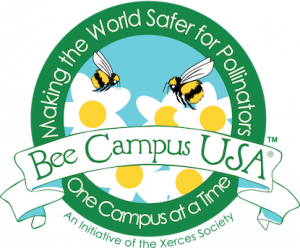Bee Campus USA
 In 2016, Bee Campus USA recognized Randolph College as the ninth educational institution in the nation and the first in Virginia to be certified as an affiliate of the Bee Campus USA program.
In 2016, Bee Campus USA recognized Randolph College as the ninth educational institution in the nation and the first in Virginia to be certified as an affiliate of the Bee Campus USA program.
The Bee Campus USA designation recognizes educational campuses that commit to a set of practices that support pollinators, including bees, butterflies, birds, and bats, among thousands of other species. This includes raising awareness of the importance of pollinators, creating sustainable habitats for pollinators, and developing a pollinator-friendly pest management plan.
Learn more at beecityusa.org.
How We Support Pollinators
- Hosting events, workshops, or presentations that are pollinator focused
- Offering pollinator-focused curriculum and continuing education
- Educating campus and the broader community about the importance of pollinators
- Sponsoring service-learning projects
- Developing an integrated pest management plan
- Maintaining a committee comprised of faculty, staff, administrators, and students to lead these efforts
Improving Habitat on Campus
Our first pollinator garden on campus was planted on Earth Day, April 22, 2019 and it has been expanded every year since. In 2021, we added two butterfly benches so that you may sit awhile and enjoy the garden.
It has been a low maintenance addition to the campus that provides host plants, nectar sources, and shelter for our valuable pollinators. Gardens like these are easy to establish and can be any size that works for your space.
Resources for Native Plants & Pollinator Gardens
Xerces Society Mid-Atlantic Region Resources
The Xerces web site has lists of native plant species, recommendations for garden plantings, and countless other resources. If you are not in the Mid-Atlantic region, they have additional pages dedicated to all of the different regions in the US.
Native Plants in Virginia
Historically, exotic plants have been favored in the landscaping and nursery industries. As a result, native plants are not as abundant in the urban landscape as our pollinators and beneficial insects need. Native plants support insect life cycles, are evolved to thrive in the Virginian climate and soils, and provide habitat and food sources for our birds and mammals. By planting native species, you are directly contributing to restoring and preserving biodiversity in your community. Here are some lists to get you started!
- Digital Atlas of Virginia Flora – Searchable database for regionally (by county) native plants in Virginia
- VA Department of Conservation and Recreation – Piedmont Native Plant List
- Lady Bird Johnson Wildflower Center – Native Plant List for Virginia
- Plant Virginian Natives – Regional Native Plant List
- Native Plant Sources in Central Virginia (PDF)
Invasive Plants
Invasive plants are defined as exotic species that are ecologically damaging. These invasive species should be actively removed from your landscape. Use the Invasive Plants Management Tool to identify invasive species in Virginia and find recommendations for their management.